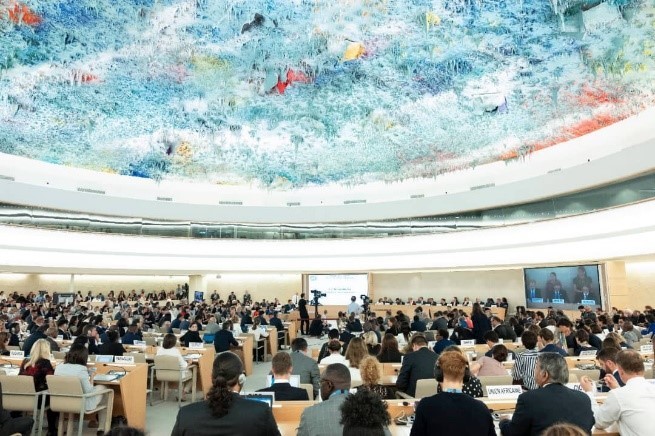Today, 12 October 2018, United Nations (UN) member states voted to allow Bahrain a seat on the UN Human Rights Council (HRC). Bahrain ran unopposed, effectively guaranteeing it membership despite an atrocious record of systematic human rights violations, including consistent acts of reprisal against activists for engaging with the HRC itself. Americans for Democracy & Human Rights in Bahrain (ADHRB) unequivocally condemns Bahrain’s competition-free election to the HRC and regrets that member states did not abstain from the vote. We are severely concerned by the Council’s election process and the consequences Bahrain’s new membership will have on both the functioning of the HRC and the grave human rights situation in the kingdom.
Bahrain received 165 votes during the Council membership elections, falling towards the bottom of Asia-Pacific states elected this year. Article 9 of General Assembly Resolution 60/251 calls on Member States of the Council to “uphold the highest standards in the promotion and protection of human rights.” However, since mid-2016, Bahrain has taken increasingly repressive measures to silence dissent and imprison political activists. The government has dissolved all opposition political parties, silenced independent media, jailed human rights defenders and political leaders, and criminalized forms of expression and association.
In addition to suppressing fundamental freedoms, Bahrain has consistently refused to engage with the Council it now sits on, and it is one of the worst perpetrators of reprisals against civil society for cooperating with the HRC and its mechanisms. Bahrain is regularly criticized by the UN Assistant Secretary-General for Human Rights and the Secretary-General’s reports on reprisals. In the Secretary-General’s most recent report, he emphasized the serious violations of government-sanctioned reprisals and cited Bahrain’s retaliation against activists as an “ongoing trend of major harassment and intimidation against human rights defenders … [that includes] the imposition of travel bans on selected individuals; the arrest, detention, and ill-treatment of targeted individuals; and one particular case involving sexual assault and torture as a form of reprisal.” Bahrain’s most prominent human rights defenders, like the imprisoned Nabeel Rajab and Ebtisam al-Saegh, who was arrested, tortured, and raped by security forces, are specifically singled out for engaging with the UN.
The Office of the High Commissioner for Human Rights has also repeatedly condemned Bahrain’s abuses in advance of the HRC election. This past June at the 38th session of the HRC, Former High Commissioner for Human Rights Zeid Ra’ad al-Hussein criticized Bahrain’s flagrant disregard for human rights and its continued efforts to bar the engagement of civil and political society. While both the High Commissioner and ADHRB urged the Government of Bahrain to work with the OHCHR to implement reform recommendations ahead of the November parliamentary elections, it has refused to cooperate. Meanwhile, Bahrain has refused to allow any Special Procedures into the country to evaluate the situation since 2006 despite numerous mandate holder recommendations and requests calling for a visit. The kingdom has been the subject of 49 joint communications from Special Procedures offices in the last five years, and 85 communications since 2011. It has also faced intense scrutiny by the UN Human Rights Committee over noncompliance with the International Covenant on Civil and Political Rights (ICCPR), while simultaneously failing to meet hundreds of Universal Periodic Review (UPR) recommendations. The Working Group on Arbitrary Detention, in its decision declaring Nabeel Rajab’s imprisonment unlawful, recently warned that Bahrain could be engaged in crimes against humanity due to its widespread use of arbitrary arrests.
Exacerbating Bahrain’s abysmal relationship with international human rights bodies and mechanisms, the kingdom’s own announcement that it was running for the Council seat contained disqualifying references to abusive conduct. In its voluntarily pledge for membership, Bahrain committed to “[eliminating] any incitement to … anti-nationalism” publicly asserting that it will continue to target and suppress nonviolent dissent – already widely defined to include peaceful criticism of the government. That Bahrain is allowed to promise deliberate human rights violations, reject constructive engagement with the Council, whitewash its crimes, and still be granted a seat demonstrate core problems with the HRC’s election process. Bahrain has been confirmed alongside other states implicated in extreme human rights violations, with all regional groupings hosting competition-free slates. States are no longer working to reform in order to earn a highly sought-after seat at the Council, undercutting the authority of the HRC itself.
“Bahrain is, without the shadow of a doubt, unfit to hold the membership on the Human Rights Council,” says ADHRB Executive Director Husain Abdulla. “Only by running unopposed could a country with such a well-documented record of rights abuses gain a seat at the HRC, and it is an outrageous example of a broken election system that undercuts the legitimacy of the Council. This is a sad day for the international human rights system, and it will allow Bahrain to continue whitewashing its abuses on an even bigger stage. Bahrain has shown utter disregard for the Council before – now that it’s a member, the government is going to wreak even more havoc from the inside. This level of impunity for such egregious violators of human rights is simply unacceptable. The international community must take urgent new steps to hold Bahrain accountable for its crimes. ”
With Bahrain’s worsening crackdown on civil and political society, its ongoing reprisal campaign against human rights defenders, and its continued refusal to cooperate with human rights bodies or mechanisms – including the HRC itself – the kingdom is wholly unfit for a seat on the Council. We deeply regret the competitive-free election process and we condemn Bahrain’s membership. ADHRB urges the international community to redouble its efforts to push Bahrain to cooperate with the Council’s mechanisms and adhere to all international human rights standards. The Council also must now more than ever hold Bahrain accountable to its international human rights obligations and end its spiral of repression at home.





